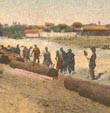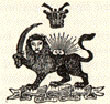| |
| |
IN THIS WEEK'S LETTER
We bring you our first collaborative file produced with the Museo Glauco Lombardi in Parma (Italy), Marie Louise's travel medecine chest. Then there's the bicentenary of the French colonial town of Dakar, a new CD-ROM game for young adults, and a conference in Paris on France and Persian relations during the reign of the Qajars. And don't forget the clutch of new books, not to mention a recent review of Michael Leggiere's book on the 1813 campaign published in 2002.
Enjoy.

|
|
|
| |
THIS MONTH'S OBJECT
Marie-Louise's travel medicine chest
Marie Louise's travel medicine chest is one of the most unusual objects in the Museo Glauco Lombardi collection. It was almost certainly made during Marie-Louise's French period, since the Bohemian crystal phials bear the monogram ML underneath an imperial crown. This presentation of the piece inaugurates a Fondation Napoléon/Museo Glauco Lombardi collaboration.
© Museo Glauco Lombardi

|
|
|
| |
BICENTENARY OF THE FOUNDING OF DAKAR
It was in 1857 that ship's captain Protêt took the fishing village of Dacar au Sénagal, near the key slaving island of Gorea. After building a fort there, he raised the French flag over it on 25 May and renamed the site Dakar.
© Founding of Dakar, engraving on postcard © Archives du Sénégal

|
|
|
| |
THE NAPOLEONIC CD ROM «THE VULTURE»
An educational CD ROM set in Paris during the Napoleonic period has just been produced by the French company Nemopolis, and our own Emmanuelle Papot (author of the French version of the Bulletin) participated in researching the historical context for the game. The aim of the game is to use a specially prepared First Empire encyclopaedia to help you to solve some mysteries and to prevent the criminal Du Noï from committing further crimes.
© Nemopolis 2006

|
|
|
| |
CONFERENCE ON FRANCO-PERSIAN RELATIONS IN PARIS
On the occasion of the bicentenary of the signature of the Franco-Persian treaty at the Finkenstein château on 4 may, 1807, the International Qajar Studies association (IQSA) is organising at the Bibliothèque Marmottan (Boulogne Billancourt), under the aegis of the Fondation Napoléon, a conference on Franco-Persian relations.
© qajarstudies.org

|
|
|
| |
200 YEARS AGO
Polish Campaign
After two months of siege, Danzig finally capitulated on 24 May, 1807.
«In this important garrison town we have found huge amounts of artillery and considerable numbers of stores containing British merchandise and enough corn to feed the army for two years». (Correspondance no. 12,646, 25 May, 1807)
Marshal Lefebvre, who had led the siege on the French side, had spent three days negotiating with the Prussian general Kalkreuth. The terms finally agreed (which had been agreed in advance with Napoleon – Correspondence no. 12,629) were that the garrison could out march with all the honours of war, with drums beating, matches lighted, and standards flying. The terms were generous because Napoleon was eager to put an end to the siege since the summer (and the fighting season) was approaching and he needed to remove the threat to his rear and to reposition the troops elsewhere. Napoleon then ordered the siege of the nearby Weichselmünde fort, but the Russian general Kamenski positioned there had fled with his troops, and the garrison shortly afterwards capitulated. In recompense for Lefebvre's services, Napoleon granted him the title “Duc de Dantzig” in a letter to the Senate dated 28 May, (Correspondence, no. 12,666), but he did not inform him directly, merely noting to the Marshal on 29 May “I am […] very satisfied with your services, and I have already given proof of this, which you will discover when you read the latest news from Paris and which will leave you in no doubt as to my opinion of you” (Correspondence, no. 12,683).
Constantinople, 27 May, 1807, the Sultan Selim III was overthrown and replaced by Mustafa IV.
Improved Franco-Ottoman relations after the disastrous British action in the Dardanelles (March 1807) weakened the position of Sultan Selim III at home. His janissaries were hostile to his reform policies and saw alliance with France as dangerous. They also felt that the Sultan's anti-Islamic reforms were directly responsible for the decline of the Ottoman empire. A mutiny in part of the army ensued, and six days later the Great Mufti of Constantinople backed the rebels by promulgating a fatwa calling for the deposition of Selim III.
150 YEARS AGO
Colonies
The 25th May, 1857, saw the official founding of the town of Dakar in Senegal.
International relations
Prussia and Switzerland signed a peace treaty in Paris on 26 May, 1857, which was ratified by plenipotentiaries of the great powers. (Almanach Napoléon 1858) : «Plenipotentiaries from France, Austria, Great Britain, Prussia and Switzerland met in the French Ministry of Foreign Affairs to sign a treaty definitively settling the Neufchâtel question, whereby HM the King of Prussia renounced his sovereign rights to this principality granted him by certain treaties, and the Swiss Confederation made certain engagements so as to reassure King Frederick William regarding the people of Neufchâtel».
(Le Moniteur Universel, 27 May, 1807)
A revolution in Neufchâtel (March 1848) had put an end to Prussian domination, which had begun in 1707, but the London Protocol (signed by the great powers in 1852) turned the clock back, giving the Prussian king once again rights over the Canton of Neufchâtel. After the failure of a Royalist insurrection in Neufchâtel in 1856, tension reached breaking point between Frederick William IV and Jacques Stämpfli, federal councillor in charge of Swiss foreign relations. Napoleon III then organised the conference of the great powers which led to the peace treaty of 26 May, 1857.
Wishing you an excellent, Napoleonic, Week.
Peter Hicks
Historian and Web editor
THE NAPOLEON.ORG BULLETIN, No 417, 25 – 31 May, 2007
Interested in the work of the Fondation Napoléon? Why not participate, either generally or in a specific project, by making a donation.
© this Napoleon.org weekly bulletin is published by the Fondation Napoléon. Reproduction or all or part of this bulletin is forbidden, without prior agreement of the Fondation Napoléon.

|
|
|
|
|
|
|
|
Got a problem with a link in the Bulletin? Go to the homepage: http://www.napoleon.org
THIS WEEK in the MAGAZINE
Just Published
- CD-ROM: The Vulture, by Nemopolis
- La diplomazia dei Cento Giorni: Napoleone e il Congresso di Vienna, Andrea Della Nebbia
- Napoleon and Berlin: The Franco-Prussian War in North Germany, 1813, by Michael V. Leggiere - includes new review by independent scholar, Thomas Zacharis
- Lodewijk Napoleon en de kunsten in het Koninkrijk Holland (Louis Napoleon and the arts in the Kingdom of Holland), by E. Koolhass-Grosfeld et al. (eds)
WHAT'S ON
Re-enactments:
- Re-enactment of the Battle of Rivoli, 1797-2007, Rivoli, Italy
Conferences:
- Diplomats and Travellers in and from Qajar Persia, Paris, France
- Napoleon at the Zenith: a bi-centennial seminar, Liverpool, UK
Exhibitions:
- The Polish and the Légion d'honneur, Paris, France
- People, portraits, places and the abolition of the Slave trade, National Portrait gallery, London, UK
- Napoleon's Description de L'Egypte, Dallas, Texas, USA
- Napoleon, Trikolore und Kaiseradler über Rhein und Weser, Wesel and Minden, Germany
- "The trace of the eagle", the Invalides dome, Paris, France
<<
|
|





